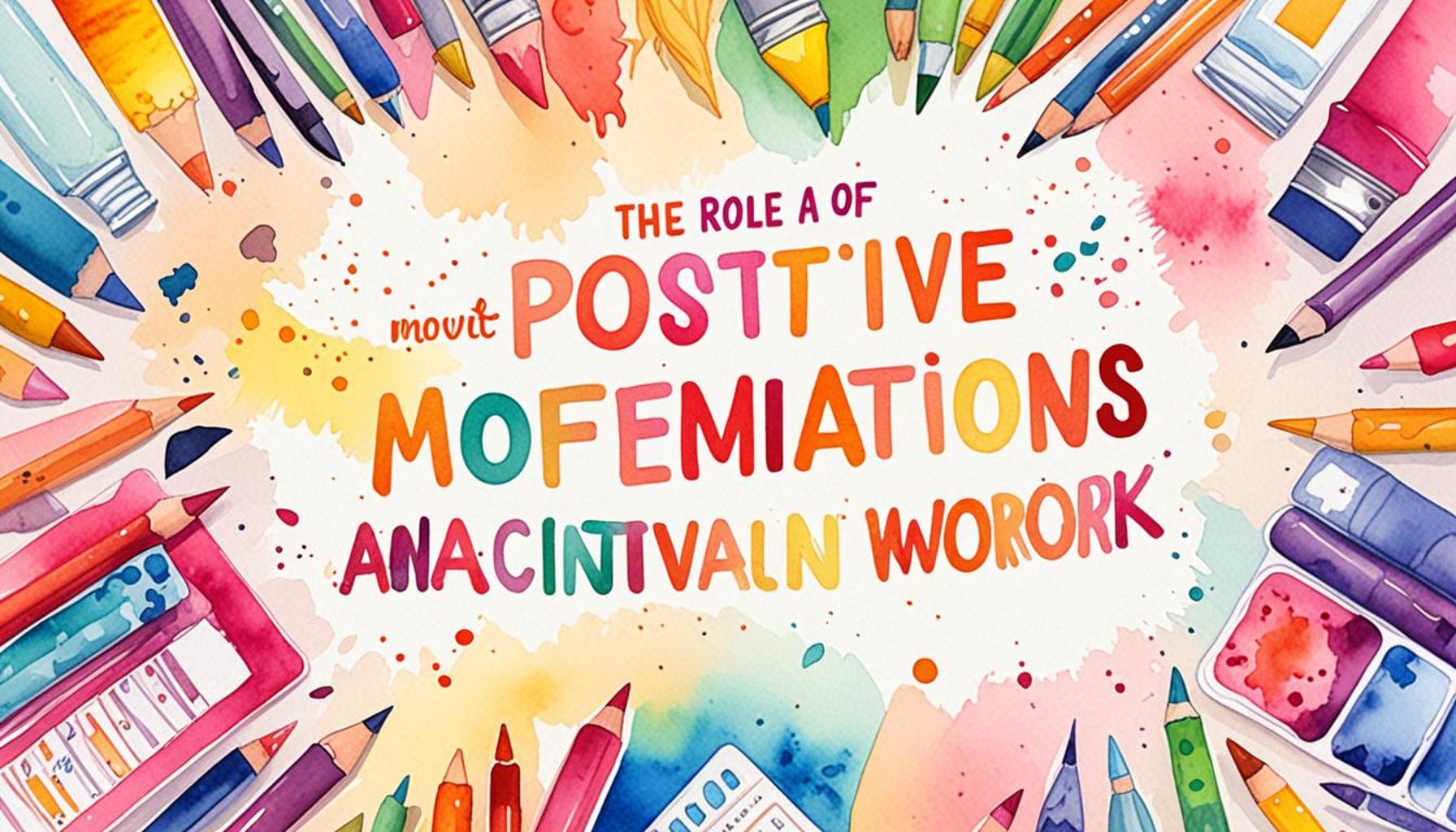The Role of Positive Affirmations in Maintaining Motivation in Challenging Work Environments

Understanding the Impact of Positive Affirmations
In the ever-evolving landscape of Nigeria’s work environment, where economic challenges and competition can create a high-pressure atmosphere, maintaining motivation is crucial for success. To effectively navigate through such complexities, many individuals are discovering the transformative power of positive affirmations. These statements, simple in form but profound in effect, can fundamentally shift our mindset and enhance our resilience in the face of adversity.
Why Positive Affirmations Matter
Positive affirmations act as mental anchors, providing direction and clarity when challenges become overwhelming. The benefits of incorporating positive affirmations into daily routines are multifaceted:
- Boosting Self-Esteem: Consistently repeating affirmations like “I am capable and strong” can significantly enhance an individual’s belief in their abilities. In a country where self-doubt may be exacerbated by societal challenges, cultivating a positive self-image is essential.
- Enhancing Focus: By affirming goals such as “I am achieving my targets,” individuals can sharpen their concentration, allowing them to prioritize tasks more effectively. This focused mindset can be particularly beneficial in sectors like technology and finance, where attention to detail directly impacts success.
- Reducing Stress: The act of saying positive affirmations can lead to a meaningful shift in mindset. Instead of succumbing to workplace stress—which is prevalent in Nigeria due to economic fluctuations—individuals can cultivate resilience that ultimately leads to lower anxiety levels.
As Nigeria’s labor markets continue to evolve, it becomes increasingly important to understand how a positive mindset influences not only individual performance but also overall productivity within organizations. For instance, a worker in the manufacturing sector may face constant pressure from deadlines and economic instabilities. Yet, by employing positive affirmations, they can transform their approach, leading to increased job satisfaction and performance output.
The Science Behind Affirmations
Research has shown that positive affirmations can significantly impact brain function, activating areas tied to self-related thinking and emotional regulation. This neural reaction can foster a sense of control, empowering individuals to adopt a proactive stance in managing stress. Furthermore, embedding affirmations into daily routines—whether through morning rituals or mental reminders throughout the day—can create a more resilient work environment. For example, a team leader might begin meetings with an affirmation to boost morale and encourage collaboration among team members.
Explore the transformative effects of positive affirmations and investigate how they can empower you to tackle work challenges more effectively. Whether you’re navigating the complexities of the Nigerian job market or looking to enhance your personal well-being, integrating positive affirmations into your daily life may hold the key to unlocking your fullest potential.

ADDITIONAL INSIGHTS: Expand your understanding here
Harnessing the Power of Positive Affirmations
In Nigeria’s competitive job market, where uncertainty and economic pressures can often lead to burnout, positive affirmations emerge as a powerful tool for maintaining motivation. By regularly engaging with affirmative statements, individuals can cultivate a positive internal dialogue that not only boosts morale but also reinforces a sense of purpose in their work. These affirmations serve as mental catalysts, enabling employees to overcome obstacles and focus on their goals, regardless of the challenges they face.
Transforming Challenges into Opportunities
Within the context of challenging work environments, positive affirmations can drastically change perspectives. Instead of viewing setbacks as insurmountable issues, employees can recast these situations as opportunities for growth. For instance, a salesperson in a struggling economy might affirm, “Every rejection brings me closer to my next success.” This perspective enables them to approach their tasks with renewed vigor, transforming potential discouragement into motivation.
Implementing positive affirmations in the workplace can take various forms. They can be integrated into:
- Daily Rituals: Starting each day with a set of affirmations can set a positive tone. Sharing group affirmations in team meetings fosters a collective resilience.
- Visual Reminders: Writing affirmations on sticky notes and placing them in visible areas, such as computer screens, can serve as constant reminders of one’s capabilities. This technique reinforces motivation throughout a busy workday.
- Scripting Future Success: Employees can write scripts reflecting their aspirations, imagining the successful outcomes they desire. This activity prepares the mind for success, enhancing overall performance as focus is redirected toward positive outcomes.
The integration of these techniques within the workplace not only benefits individual employees but also contributes to a healthier organizational culture. Positive affirmations can mitigate the stress levels commonly found in high-pressure industries, such as telecommunications and banking, where deadlines and performance metrics can feel overwhelming. By creating an environment where affirmations are embraced, companies nurture a workforce that is not only more motivated but also more engaged.
The Broader Implications on Workplace Culture
A shift towards positivity in workplace interactions can have a ripple effect. Employees who regularly practice positive affirmations often inspire their colleagues, fostering a sense of community and shared purpose. This camaraderie can be particularly crucial in Nigeria, where collaborative efforts and networking play a significant role in professional success. Encouraging positive affirmations among peers not only uplifts individual spirits but also helps cultivate a supportive atmosphere.
As we seek to understand the implications of positive affirmations in challenging work settings, it becomes clear that these simple statements hold substantial power. They can inspire not only personal motivation but also contribute to a thriving workplace culture that resonates throughout various sectors, ultimately leading to a more productive and resilient workforce.
| Advantages | Description |
|---|---|
| Increased Resilience | Positive affirmations help individuals develop a stronger mental framework to withstand challenging situations, transforming stress into productive energy. |
| Enhanced Self-Efficacy | Using positive affirmations fosters a belief in one’s abilities, boosting the confidence needed to tackle demanding tasks and overcome obstacles. |
| Improved Focus | Affirmations can serve as reminders of priorities, helping to enhance concentration and productivity in the face of distraction. |
| Positive Mindset | Regular practice of affirmations cultivates a more optimistic outlook, reducing negative self-talk that can detrimentally impact motivation. |
The integration of positive affirmations into daily routines offers significant advantages, particularly in challenging work environments where motivation can wane. As individuals harness the power of affirmations, they pave the way for a transformative approach to professional challenges. Not only do these techniques strengthen resilience, but they also enhance self-efficacy—crucial elements in achieving long-term success and stability in the workplace. By internalizing these practices, employees become more adept at navigating obstacles, which ultimately contributes to a healthier work atmosphere. In essence, the consistent use of positive affirmations is not just a tool for individual growth but a catalyst for collective progress within teams, cultivating a culture where motivation can thrive even in adversity.
LEARN MORE: This related article may interest you
Embracing the Science Behind Positive Affirmations
The effectiveness of positive affirmations in boosting motivation and enhancing performance in challenging work environments is underscored by a growing body of scientific research. Various psychological studies have demonstrated that positive affirmations can lead to significant improvements in mental health and job performance. For instance, research conducted by the University of California found that individuals who engaged in regular affirmation practices exhibited lower levels of stress and anxiety, thereby enabling them to approach their tasks with a clearer mindset.
Neuroscience and Affirmations: A Connection Worth Exploring
Delving deeper into the science, researchers have identified that positive affirmations can reshape neural pathways within the brain. According to a study published in the journal Psychological Science, participants who practiced positive affirmations experienced increased connectivity in regions of the brain associated with self-related processing and motivation. This neuroplasticity suggests that affirmations can literally change how we think about ourselves and our capabilities, paving the way for more resilient professional attitudes, especially crucial when operating within the Nigerian work context where motivation can regularly be eroded by external pressures.
Furthermore, positive affirmations can trigger the release of dopamine, a neurotransmitter linked to pleasure and reward. By cultivating a focus on one’s strengths and successes, individuals can foster a sense of achievement that in turn propels their motivation forward. For instance, a teacher in Nigeria may assert, “I have the power to inspire my students every day.” This affirmation not only acknowledges their professional impact but also boosts their determination, thus enriching their teaching practice even amidst challenges such as limited resources or large class sizes.
The Role of Leadership in Affirmation Practices
Leadership within organizations can play a pivotal role in establishing a culture that embraces positive affirmations. When leaders actively engage in the practice, they set an example for their teams. Leaders can use affirmative language during team meetings, offering statements such as, “I believe in our collective ability to overcome challenges.” This approach not only empowers individual workers but also nurtures an environment of trust and encouragement.
Moreover, companies could integrate positive affirmations into their training programs. Workshops that focus on self-affirmation techniques can equip employees with the tools they need to foster resilience and motivation. Unilever Nigeria, for instance, has adopted personal development initiatives that emphasize positive thinking and self-affirmation, leading to noticeable increases in team motivation and productivity.
The Global Perspective and Local Adaptation
While the concept of positive affirmations may originate from a broader psychological context, the principle can be adapted to fit the unique nuances of the Nigerian business environment. African proverbs often reflect wisdom that aligns with affirmational practices, such as “Little by little, one travels far.” This cultural perspective underscores the idea that a consistent, positive approach can foster remarkable long-term achievements. Thus, incorporating local beliefs into affirmation practices can further enhance their impact within Nigerian workplaces.
In summary, positive affirmations extend beyond mere statements; they embody a psychological strategy backed by scientific research, leadership initiatives, and cultural relevance. As employees harness the power of these affirmations, they not only cultivate their motivation but also contribute to a more dynamic and resilient work environment, capable of tackling the unique challenges presented by Nigeria’s workforce landscape.
RECOMMENDED: Check out this similar article
Conclusion: Fostering Motivation Through Positive Affirmations
In conclusion, the role of positive affirmations in maintaining motivation within challenging work environments is both profound and transformative. As evidenced by scientific research, these affirmations stimulate brain function and trigger positive emotional responses, allowing employees to better cope with stress and uncertainty. They not only enhance individual resilience but also foster an atmosphere of collaboration and optimism when ingrained into organizational culture.
The integration of positive affirmations into daily routines creates a ripple effect that extends beyond personal achievement. Leaders who model this behavior inspire their teams, cultivating a workplace where encouragement and motivation thrive. By actively adopting practices that embrace positive affirmations, organizations can address the unique challenges in the Nigerian context—such as high-pressure situations and resource constraints—by harnessing the inherent strength found in collective motivation.
Furthermore, the alignment of positive affirmations with local cultural wisdom enhances their relevance and impact, creating a sense of belonging and unity amongst employees. As companies like Unilever Nigeria demonstrate, when organizations prioritize affirmation-focused initiatives, they not only boost productivity but also strengthen their workforce’s resolve against the forces that may impede progress.
Ultimately, in a world where challenges are a constant, embracing the power of positive affirmations offers a pathway toward not only surviving but thriving. Employing this approach empowers individuals and teams alike, paving the way for innovation and success in any work environment. As organizations consider implementing these strategies, they must remember: every voice counts, and every affirmation can illuminate the path forward.


